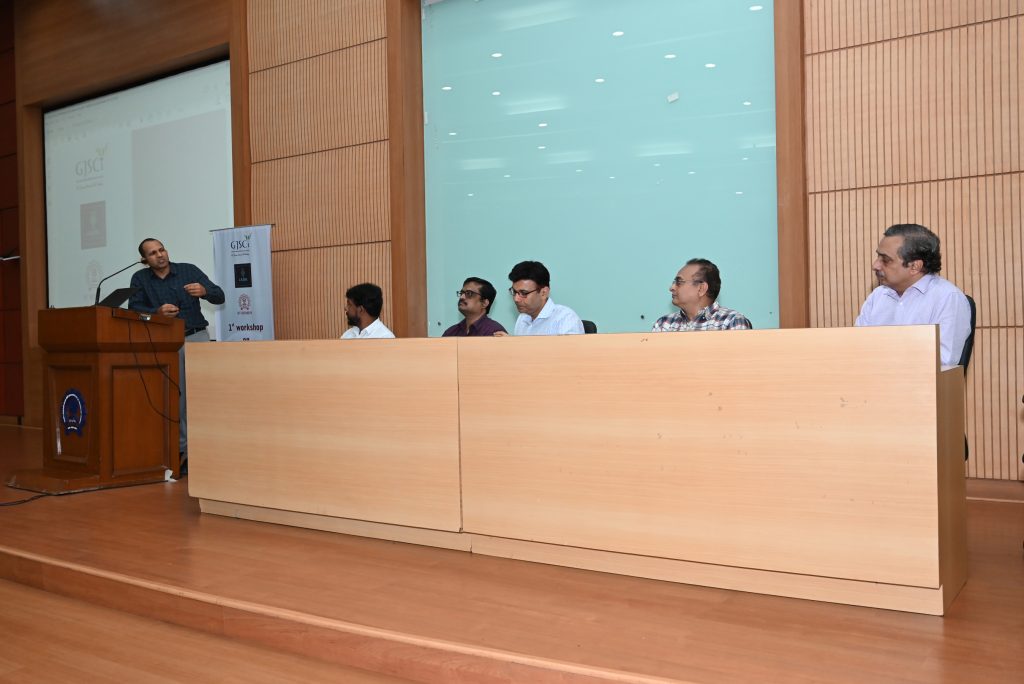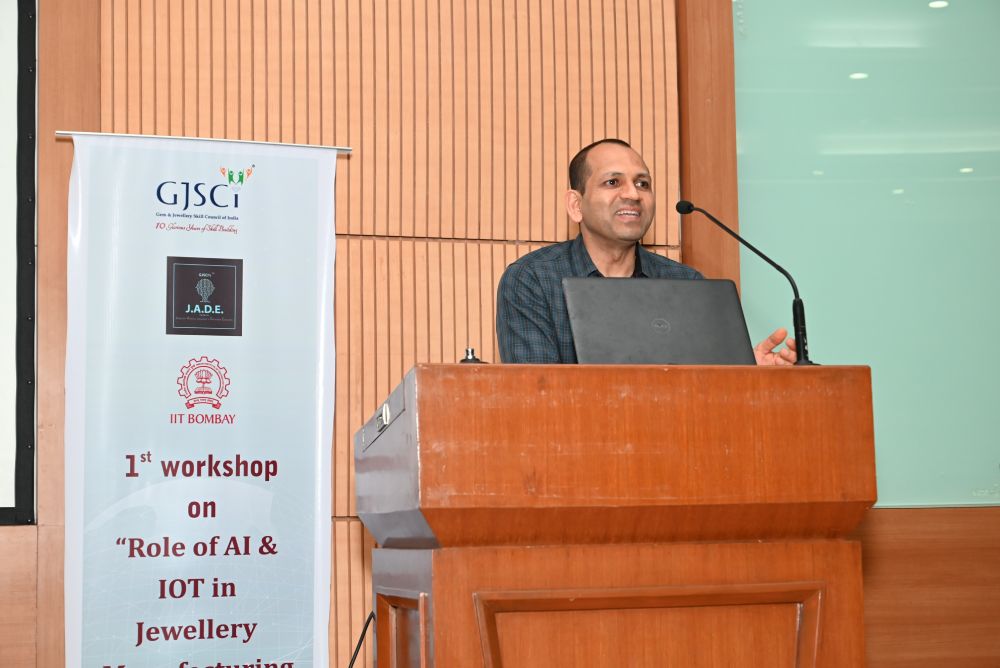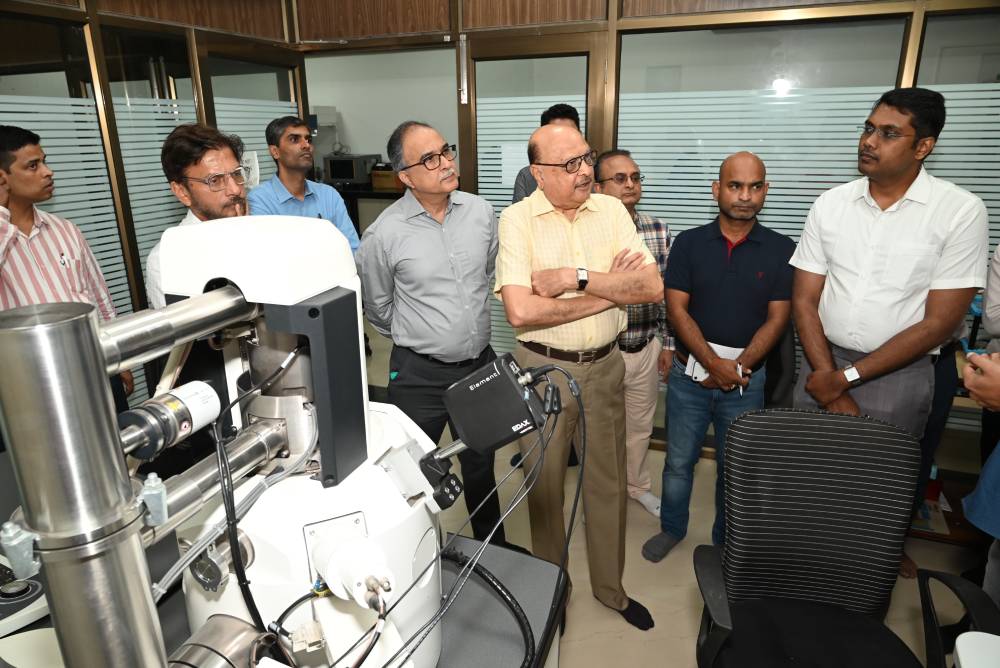Gem & Jewellery Skill Council of India (GJSCI) and Indian Institute of Technology (IIT) Bombay held a one-day workshop on the ‘Role of Artificial Intelligence (AI) and Internet of Things (IoT) in the Jewellery Manufacturing Process’ on 7th October, 2022 in Mumbai. Attended by 150 participants, the workshop was held at the Victor Menezes Convention Centre on the 560-acre IIT Bombay campus in Powai.
The opening ceremony was graced by Mr. Sanjay Kothari, Chairman, GJSCI; Prof. Milind Atrey, Dean (R&D) & Institute Chair Professor, IIT Bombay; Mr. Rajeev Garg, ED & CEO, GJSCI; and Mr. Shishir Nevatia, Director, GJSCI among others.
The AI pilot project – the first of its kind in the world for the gem & jewellery industry – under the GJSCI’s Jewellery Artificial Intelligence & Data Science Excellence (JADE) Centre, was launched in 2020. It witnessed participation from four leading jewellery manufacturers and was later expanded to include seven retailers from across India.
Mr. Sanjay Kothari said, “I envision Indian jewellery manufacturers to be the world leaders in implementing the latest technology, particularly the AI and Machine Learning (ML) models, which could put us right at the top of the value chain in terms of quality and the product which we are offering to the market. The project has been supported by the Ministry of Electronics and other industry entities, but it will be completed in less than a year’s time. I’m sure that with greater participation and support from industry bodies, this AI project will help the Indian gem and jewellery industry to harness the power of these complex technologies to continue our leadership in the category.”
The project lead Prof. Asim Tewari, Dept. of Mechanical Engineering, IIT Bombay presented an overview of the progress made so far in the deployment of AI to increase productivity, quality, and efficiency in jewellery manufacturing by predicting and avoiding casting defects such as gas, shrinkage, surface porosity and bubbles, which result in deformities and affect productivity and cost.
In a session focused on Gold Casting and Gold Alloy Systems, Prof. Tewari offered a granular understanding of the many properties of complex metal alloys including gold and silver, and explained their behaviour under varying conditions, especially when moving from the liquid state to a solid phase during the casting process. He said that AI can play a huge role by handling numerous complex variables around the casting process to provide a solution to jewellery manufacturers.
Prof. Tewari explained, “The aspect which we need to really nail is the geometric complexity. We need to capture jewellery designs in a parametric manner and provide it to an AI model. We have already been parameterizing jewellery pieces and have an entire library of them to create an AI model that is primarily a black box – it’s an artificial neural network design model that analyses the alloy chemistry, geometry, parametrics, the investment process details, and the 3D printer details. Then the AI model provides you the pouring temperature, the mould temperature, the feeder design, the riser design, the placement of feeders and risers, and the chills. The AI model is continuing to learn and train on real-world simulations. The more good data we get, the better the deep network will become.”
Prof. Makarand Kulkarni of IIT Bombay delivered a presentation on the rise of Industry 4.0 or the Fourth Industrial Revolution, which will usher in the “smart manufacturing” ecosystem that brings together advanced manufacturing techniques, IoT and machine intelligence to create systems capable of self-analysis.
The GJSCI-IIT Bombay project also aims to offer an industry-wide solution to predict jewellery demand at the retail level by using AI for deep analysis of the retailers’ sales data, ERP databases, as well as variables such as the jewellery, customer and retailer, and external factors like exchange rate, gold price, repo rate of interest, stock market performance, etc. “So these are the basic drivers, once you’re able to capture them, you’ll be able to predict very precisely what would be the demand for a specific type of jewellery, for a specific candidate, for a specific weight category, at a specific time, at a specific geo location,” Prof. Asim Tewari observed.
“The GJSCI has a very high state-of-the-art AI hardware centre, which is right now being managed by us. But very soon they will be having engineers of their own who will be running that centre. And the programmes which we are developing here, will be sent to the four manufacturers and seven retailers working with us and with the help of GJSCI they will be running them in their data centres on their AI platforms,” he added.

Moderated by Prof. Tewari, a panel discussion (pictured above) on ‘The future of Indian Jewellery Manufacturing’ featured Mr. Rajeev Garg, Mr. Bobby Kothari, Mr. Rashesh Desai, Prof. Makarand Kulkarni of IIT Bombay, and Mr. Prassana V. from Uni Design.
Mr. Rajeev Garg said, “We realised early on that data integrity is needed for the AI model to be successful. The big breakthrough was getting the participants to share their data, which is completely encrypted and not revealed to anyone including the researchers themselves. Another major step forward for the project was that the retailers willingly shared the sales data of their stores. I certainly see a lot of possible outcomes in the predictive analytics, which we all as an industry are looking forward to.”



